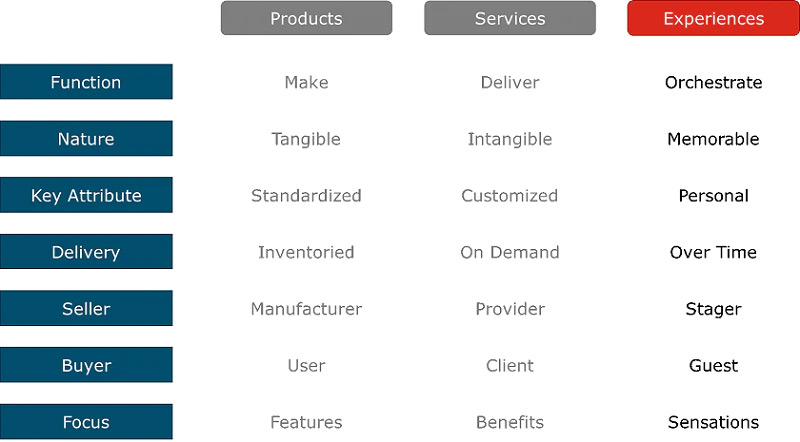Building Effortless
AI-powered experiences platforms have emerged as a new foundation for the effortless future – enabling the orchestration of how humans interact with technology, and with each other. For businesses, the evolution from products and services to experiences focus represents a progression of economic value and enables the commercialization of new AI technology and big data. Five important shifts will impact how experiences are designed and commercialized going forward. This includes transitioning from monolithic platforms toward experiences composability, integrating new AI technologies (into everything), expanding development focus and scope from point process automation to holistic business model transformation, replacing the traditional product/services mindset with “experiences” thinking, and moving away from siloed development efforts toward “fusion ecosystems.”
The stakes are very high: recent Avaya research indicates that 2 in 10 customers will walk away after a single bad experience. 6 in 10 will walk away after several bad experiences. To make matters even worse, many will also post their bad experiences on social media and will tell their friends and family members about them.
And many new business drivers require the development of new experiences including managing Hybrid Work, maximizing data and new technologies, and connecting with the API economy to accelerate growth.
THE ECONOMICS OF EXPERIENCES
“EXPERIENCES ARE THE NEW CURRENCY. AND OUR MEMORIES ARE THE BANK ACCOUNTS.”
Pine and Gilmore got it right many years ago when they identified “a new economic era in which all businesses must orchestrate memorable events for their customers, and that memory itself becomes the product.”
They prolifically stated that Experiences represent “an existing but previously unarticulated genre of economic output.” They further proposed that decoupling experiences from services opens up possibilities for “extraordinary economic expansion.”
Today, we find ourselves in the middle of this predicted growth.
SHIFT 1: FROM MONOLITHIC TO COMPOSABILITY
“INNOVATION MUST OCCUR WHEN NEEDED, NOT JUST WHEN THERE IS A BUDGET.”
Today’s business opportunities require new experiences, and creating these experiences requires business composability as a foundational capability. Composability frees a business from the technical debt of large applications that have existed for many years which have become too complex and too large to fully understand, much less to add or integrate with new technologies. By the way, these monolithic applications can be located either on-premises or in the cloud.
For these businesses, development velocity has slowed because making one change impacts the entire application. A composable architecture, on the other hand, decouples capabilities to increase services autonomy and allows changes to one service without impacting others.
SHIFT 2: HARNESSING THE POTENTIAL OF AI
“TODAY’S EXPECTATION IS THAT EXPERIENCES ARE COMPOSED, PERSONALIZED, AND AVAILABLE IN THE MOMENT.”
AI takes experiences to a whole new level – enabling “in the moment” experience creation and delivery. For the employee, AI delivers smarter collaboration. For customers, it allows them to self-compose their experiences.
However, as we have already stated, Artificial Intelligence – or information of any type — by itself does not provide economic value. It must be converted into a good, service, or experience. And it has been said that “There is nothing Artificial about an Experience!” Experiences are events that engage individuals in a personal way. AI and big data can both be used to personalize experiences – but it is the conversion of these inputs to experiences that delivers the value. And while the work of the experience creator is bounded by time, the value of the delivered experience is timeless.
SHIFT 3: FROM AUTOMATION TO TRANSFORMATION
“INCREMENTAL CHANGE IS NO LONGER AN OPTION. THE ENTIRE BUSINESS MODEL MUST BE REIMAGINED.”
Pine and Gilmore also proposed that the new Experiences Economy would demand new models for work. And this is the case. The world in which the focus was to drive more efficiencies through the automation of repetitive tasks has dramatically changed. Today’s “everything customer” (and everything employees) expect what they want when they want it and how they prefer it – in the context of a specific moment. Most of us expect the businesses we use to predict what we want even before we want it.
This requires more than automation, and cannot be addressed with outdated business models in which customers are kept at arms-length from the business engine. Going forward, every business must wrap its value around each employee and customer – so that each one feels like their favorite! Customers are no longer at the end of the supply chain – they ARE the supply chain! New experiences must be designed with a Total Experience focus in which the interaction between human action and technology is streamlined. This requires technology but doesn’t start with it. It commences with understanding the opportunity to elevate the employee or customer experience and developing the solution from the outside in. The technology that is used (which may be delivered by an AI-powered experiences platform combined with other technologies,) is secondary to understanding and developing a plan to best address the use case.
Aragon Research has coined the term Transformation Platform as a Service for “cloud services [that] specifically enable customers to reimagine and transform their business by providing business modeling and process modeling capabilities, critical digital business services, and integration to new and emerging technologies.”
SHIFT 4: EMPLOYING “EXPERIENCES THINKING”
“IT IS NOT ABOUT ENTERTAINING CUSTOMERS. IT IS ABOUT ENGAGING THEM WITH EVERYTHING YOUR BUSINESS OFFERS.”
According to Eventbrite, 3 in 4 millennials now choose to spend money on experiences rather than products. In this new economy, the primary competition among businesses is for the customer’s attention. The primary tool to compete becomes memorable experiences.
Here is a summary of some of the changes required to shift from product and services to “experience” thinking:
- Customer Satisfaction = What customer expects to get – What customer perceives they get
- Customer Sacrifice = What customer wants exactly – What customer settles for
- Customer Surprise = What customer gets to perceive – What customer expects to get
SHIFT 5: FUSION ECOSYSTEMS
“TOGETHER EVERYONE ACHIEVES MORE – IT’S TIME TO EXTEND THE POWER OF FUSION TEAMS BEYOND THE CORPORATE WALLS”
Regardless of the platform, creating and adding new experiences to existing business workflows is not easy. It requires navigating a sea of systems, applications, devices, and users. And connecting all the dots takes time and resources and is prone to error and security risk. And the current talent shortage doesn’t help with development and integration resources that are notoriously scarce, to begin with.
In the past, this type of work could be handled by the internal dev ops or outsourced to an application house. But the complexity of systems, connectors, APIs, and workflows can no longer be addressed by siloed efforts. A developer “fusion ecosystem” is required.
To fully understand this concept requires considering that many believe we are now in the Industrial Revolution 4.0 (IR 4.0). This is based on the evolution from an Agrarian to Industrial to Service to Experience Economy. A key component of each of these is the people that produce and create the value. This has shifted from harvesters to manufacturing workers to service workers and now – to experience developers (or builders!) And these experience developers must now also include customers and consumers.
INTRODUCING AVAYA EXPERIENCE BUILDERS™
“A COLLABORATIVE COMMUNITY WITH A SHARED PASSION FOR UNLEASHING INNOVATION.”
For all of the reasons just discussed, Avaya is introducing “Avaya Experience Builders™” – an ecosystem of Avaya experts, partners, developers, and customers – all working together as a community to create and deliver AI-powered experiences. This construct combines the power of unique Avaya hybrid cloud services capabilities with the additional expertise of Avaya partners and breadth of the Avaya channel to address any use case and truly deliver the art of the possible.
For customers, this empowers their DevOps, Citizen Developers, and Fusion Teams with the tools and expertise required to drive transformational change. Avaya Experience Builders™ includes over 250 technology partners, 32,000 companies in Avaya DevConnect, 154,000 registered developers – of which 24,000 are using Avaya OneCloud CPaaS™, over 7,000 channel partners and agents, and Avaya’s large global installed base of customers.
EXPERIENCE AS A SERVICE
“MAXIMIZING THE TOTAL VALUE A BUSINESS CAN OFFER TO EACH EMPLOYEE AND CUSTOMER.”
Avaya OneCloud™ is an AI-Powered Experience Platform designed to deliver both composability and easy AI integration. Avaya OneCloud™ recently won the coveted UCToday Award for “best CPaaS platform” for 2021. It also won the “Best Use of AI” award for 2021.
Avaya Experience Builders™ are using Avaya OneCloud™ to deliver new experiences across Education, Professional Services, Healthcare, Financial Services, Media and Communication Services, Technology, and Sports and Entertainment.
The power of the Avaya OneCloud™ platform combined with the activation of Avaya Experience Builders™ delivers Experience as a Service to Avaya customers, increasing the speed to value across their business and providing just the right level of development support for their specific business needs – covering the gamut from subscribing to pre-built experiences to enabling customers to self-compose their experiences.
Resources:
- For more Information about this click here : https://www.avaya.com/blogs/archives/2021/10/introducing_avaya_experience_builders/
- For more information about Avaya, Please visit : https://www.sysllc.com/product-category/avaya-partner-in-dubai-uae/
- To follow syscom page in Facebook:https://www.facebook.com/syscomuae/
- Check our latest updates in LinkedIn: https://www.linkedin.com/company/13588260/
- To follow syscom page in Twitter: https://twitter.com/sysllcuae




